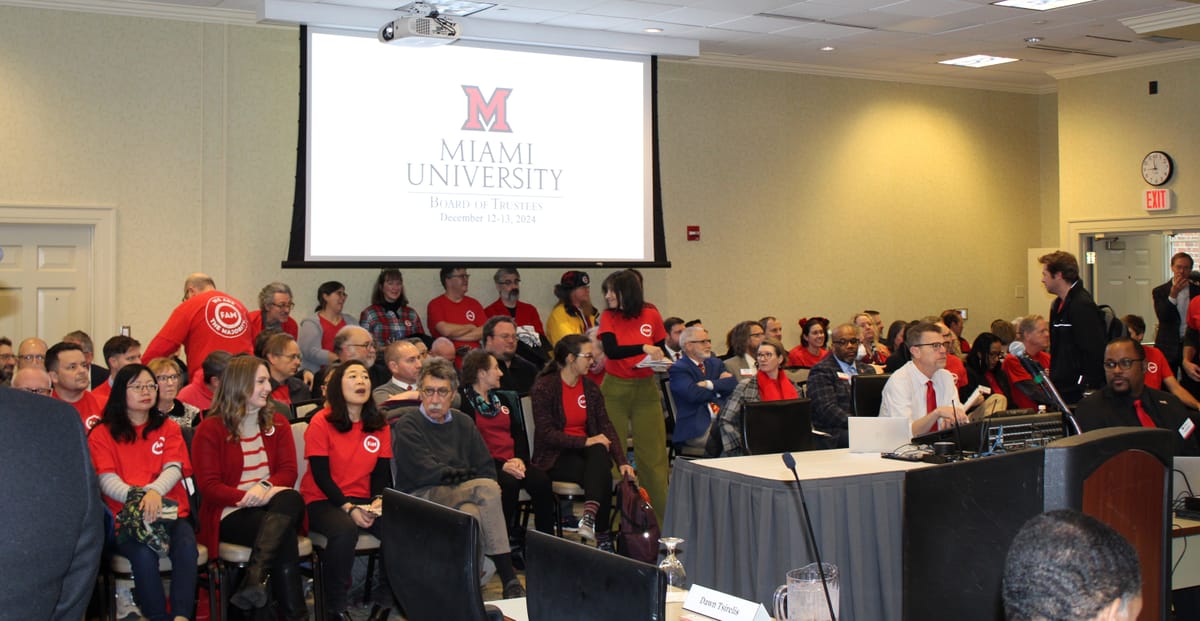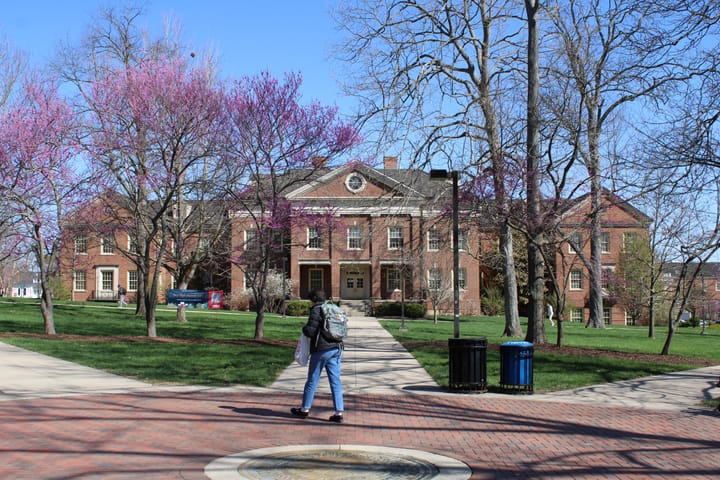Miami faculty union protests slow contract progress at Board of Trustees meeting
Faculty members and librarians attended a Miami University Board of Trustees meeting Dec. 13 to demand a "fair contract now." Negotiations have extended for almost 500 days.

For nearly 500 days, Miami University administrators and members of the Faculty Alliance of Miami (FAM) have been bargaining to create the university’s first faculty union contract.
During a Board of Trustees meeting Dec. 13, nearly 100 faculty members and librarians with FAM attended to demand faster progress.
“We unionized because our working conditions were unsustainable,” said Ken Irwin, a Web Services Librarian, during the meeting. Librarians, who voted unanimously to unionize in 2023, are bargaining separately from faculty members but still under FAM. “The university has met our efforts with foot-dragging, low-balling and gaslighting. Every day, those tactics further damage your relationship with your employees.”
Cathy Wagner, an English professor and one of the key figures in leading unionization efforts in 2022, said the university should invest more in its faculty to retain high-quality educators. The university has not provided raises to faculty or librarians for the past two years while contract negotiations have been ongoing.
At the end of public comment during the Miami University Board of Trustees meeting, members of the faculty union chanted "fair contract now" and passed out New Years Resolution cards to trustees and administrators. Video by Sean Scott
Seth Bauguess, senior director of communications, wrote in an email to the Oxford Free Press that the university’s twice-monthly bargaining sessions are consistent with the ground rules set at the start of negotiations. As of Dec. 13, Bauguess wrote, the university had reached 40 tentative agreements with FAM’s faculty and librarian units, which bargain separately.
“Despite the Union’s recent claims of delay on the part of the administration, the University’s bargaining team has been committed to presenting proposals focused on wages, hours, and other terms and conditions of employment of the faculty members and librarians, which are the only matters that are subject to collective bargaining under Ohio law,” Bauguess wrote.
Bauguess wrote that first-contract negotiations often extend beyond a year. Some of the delay at Miami, he wrote, came from FAM-initiated proposals on items that the university feels go beyond the scope of collective bargaining. Those proposals, Bauguess wrote, included adding faculty members to the Board of Trustees by modifying state law, adjusting the evaluation process for administrators, laying out remote participation in university meetings and more.
“Nonetheless, the University has responded to the stated priorities of the Union, including those that were unrelated to the terms and conditions of its bargaining unit members,” Bauguess wrote. “Good faith negotiations on a first-contract involve give and take by both parties. This is an important process that takes considerable time to accomplish.”
The union negotiations coincide with Miami THRIVE, a strategic planning initiative led by outside consulting firm Bain & Company. The initiative, which began in 2023, has been described by the university as a process to “enhance Miami’s core strengths.” The initiative includes 19 working committees including one focused on the university’s teacher-scholar model, and Bain & Company’s efficiency review of the university aimed to create $13-20 million in savings for the university.
Elena Jackson Albarrán, an associate professor in history and global and intercultural studies, pushed back against administrative proposals on faculty workload policies during the board meeting.
Proposed expectations, Albarrán said during the meeting, are based on an assumption that faculty spend eight hours per week working per three-credit class. Albarrán said an internal audit of her department found that number was actually between 12 and 15 hours.
“The current workload metric as it stands would radically destabilize the educational ecosystem that we have now,” Albarrán said. “… Simultaneously raising our teaching loads and demanding more research output will guarantee diminishing returns on Miami’s long tradition of excellence in undergraduate education.”
At the end of the public comment session, FAM members chanted “fair contract now” as they passed out New Years Resolution cards to trustees and university administrators.
According to Miami’s website on union relations, FAM and the university have reached tentative agreements on 18 policies for the faculty union, including academic freedom and the appointment and promotion of tenured and tenure-track faculty. The two parties have not reached agreements on compensation, faculty evaluations, leaves, benefits or performance improvement plans.
FAM’s librarian union bargaining tracker shows tentative agreements on 22 policies, as well as several memorandums of understanding. Compensation and benefits (excluding sick leave) are still outstanding, and the university has rejected FAM’s most recent proposal on academic freedom for librarians.




